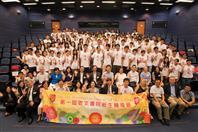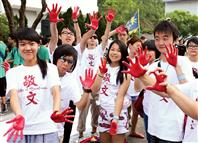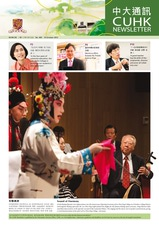C.W. Chu College is one of the five new Colleges of the Chinese University. In September this year, it welcomed its first batch of 75 students—all freshmen on the four-year curriculum. Though new and small, the College looks set to become one of the University's new highlights.
One-of-a-Kind Orientation
C.W. Chu College held an unusual orientation camp in the summer. Prof. Wong Suk-ying, Dean of Students of the College, said, 'We hope to incorporate the spirit of giving and building a harmonious society into our O-camp. So besides the usual leisure activities, we devoted a day to community outreach. The students were split into groups and paid visits to three venues to observe how community services are meeting the needs of our society.'
On that day, Peng Hejiahui of Chongqing was one of the students who went to Tin Shui Wai, which offered her an unprecedented glimpse into the city where she will be living for several years. ‘I used to see Hong Kong as an affluent metropolis. Now I know poverty lurks behind the skyscrapers.’
Certina Chan, who helped with weeding at a farm in New Territories North, learnt about organic farming through a chat with the farmers and how land development in New Territories North is impacting on the lives of the inhabitants. ‘This was a truly memorable orientation activity infused with environmental and social awareness.’
After their excursion, the students came back to campus to discuss their experiences and report to their teachers who presented them with a provocative hypothesis. ‘Someone who’s made millions after finishing their studies on a C.W. Chu Scholarship would like to give back to society, and they are commissioning you to propose, based on your observations, the most effective ways of helping the community.’ The students were not expected to come up with a perfect strategy. They could just focus on one aspect and bring creativity to the table. For instance, having one more refuse dump in a district with a large elderly population would be considered a good thing. Professor Wong remarked, ‘We hope that through first-hand experience and reflection, we can start to instil proper values in our students. In the four years of university education, the role of the College in nurturing our students is very important.’
‘Inter-view’ Between College and Students
How does the College select its students? Prof. Au Kwok-keung who chairs the College’s Committee on Admissions, Scholarships and Financial Aid said, ‘The teachers of the College meet with the students individually to share the College’s ideals with them and also to learn about their needs and aspirations.’ So what kinds of students is the College looking for?
Professor Au continued, ‘We look for students from all over—local, mainland China and overseas—in order to give everyone exposure to other cultures. Some students may have grown up in a relatively homogenous environment, say, in a local public or private housing estate and had only visited neighbouring cities. Even though they may not be the principal violinist in their secondary school orchestra or the leading actor/actress in the drama club, the College will admit them to give them the opportunity to come into contact with non-local culture and enrich their perspective. We want to allow students deprived of exposure to see brand new horizons.'
Building from Scratch
C.W. Chu College was founded in 2007. Its campus located at the Campus Circuit North is scheduled for completion in 2014. Designed to accommodate 300 students, it is small compared to other CUHK Colleges. At this stage with the campus still under construction, the students stay in I-House 3. Will this have any impact on the College’s development?
Both professors think that the College’s small size is not a concern. The advantage of a small college is that its members can develop closer relationships. Local and non-local students from different classes and backgrounds complement and learn from each other. ‘Exactly because of its smallness, each of its members exerts more influence and has higher value. Let’s see it this way: one out of 300 or one out of 3,000—which is bigger and heavier? Not to mention we have only 75 students in this founding period. I believe that after several decades when these students look back on the past, they will realize how huge an impact they had made on shaping the College, and how big the space was for them to explore, and they will be proud of it,’ said Professor Au with a mathematician’s precision.
The fact that the College does not have its own campus now does not affect the education it provides for its students. Now, all teachers and students of the College gather at the Benjamin Franklin Centre for communal dining on Tuesday, Wednesday and Thursday. Lectures delivered by professionals and alumni are held on Wednesdays, while high table dinners are organized two to three times in every term. An event was held earlier to celebrate the Mid-Autumn Festival at the open space in front of the I-house. These activities can cultivate the sense of belonging and coherence among College members. Professor Wong observes that the first batch of students’ experience of two years of ‘sojourning’ plus two years of ‘settling down’ is unique. ‘After all, our best memories are the tears and laughter that we share with friends in our youth.’
Professor Au has his take on the matter: ‘Want can be beneficial to an individual’s growth. You’ll treasure what you have after going from have-not to have. Sometimes, full contentment does not make the best memories. Aren’t New Asia alumni most proud of their College’s humble days on Kweilin Street?’
Two Sides of a Coin
C.W. College is characterized by its full residence and communal dining policy. In the age of individualism when a person can connect himself to the world using a tablet computer, is it too idealistic to expect every member of the College to embrace collective life? Professor Au explained, again with numbers.
‘Enjoying moments of solitude and embracing community life are not mutually exclusive. The spectrum of privacy should be extendable. Keeping a distance from or staying close to a group is not a choice between 0 and 1.’
C.W. College strives to provide its students with an environment in which to explore and develop relationships within a community, with members from different strata of society and different cultures. No wonder Professor Wong said, ‘Students should live their lives at this College with down-to-earth romanticism. Here you’re free to try out your ideas without concerning yourself too much with the GPA.’
CUHK members can expect to be thrilled by this small College’s energizing effect on the University community.






































































































































































Social Bookmarks